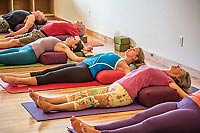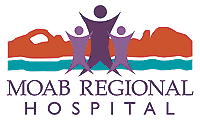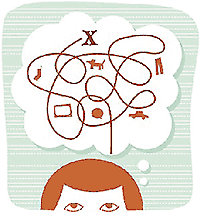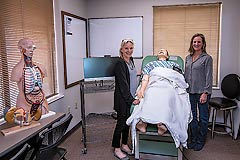|
|
HEALTHY HAPPENING June 2018
|
Why I still go to my studio class after all these years!
by Kristi Paul |
It would be so much easier to practice yoga at home today. It’s raining out, and I only have the scooter or my bike. My house needs cleaned, I need to go grocery shopping, I’m exhausted from too many hours at work, my dog looks lonely, there is still coffee that needs to be drank. As I sit here I can think of at least a dozen amazing excuses. Each one better than the next. At this point I might not have to get on my mat for the next month!
Instead, I set down my beloved (my coffee cup) and throw on my favorite pair of leggings. Off in the rain to the studio.
 As I walk through the door I have forgotten all those really amazing excuses. I feel pride for taking this 75min all to myself. I silence my phone and feel the heavy weight of commitment to the world being lifted. I begin to notice my breathing and my body for the first time today. I find my spot along the back row, grab ALL the props, and sit. I begin to worry about my hamstrings being too tight. I hope the class is shoulders and hips...if I’m lucky we’ll do backbends...I’m good at those. I come back to my breath. I set my intention: that it does not matter what my body looks like today. What does matter is how it feels today. As I walk through the door I have forgotten all those really amazing excuses. I feel pride for taking this 75min all to myself. I silence my phone and feel the heavy weight of commitment to the world being lifted. I begin to notice my breathing and my body for the first time today. I find my spot along the back row, grab ALL the props, and sit. I begin to worry about my hamstrings being too tight. I hope the class is shoulders and hips...if I’m lucky we’ll do backbends...I’m good at those. I come back to my breath. I set my intention: that it does not matter what my body looks like today. What does matter is how it feels today.
I’ve had the privilege to study yoga in India with some of the world’s greatest yogis. I’ve lived and breathed yoga 24 hours a day for months. I’ve also gone weeks without touching my mat. I’ve been at the front of the room instructing others and sat in the back hoping to just get by with where my body is at. The one thing that never changes is why we are all here today. Why we come together, in this common room, from different places, all different ages and abilities...to this moment. Everyone’s “why” will be different. While we are all taking the same class, with the same teacher, we will all get something different out of the practice today.
Yoga is a practice intended to make us wiser, more able to understand things than they were before. The Yoga Sutra says that each person gets different things from the same teaching based on his or her own perspective. A good yoga teacher can hold a mirror in front of you, giving you perspective into yourself. When my practice is “successful” it is not because I mastered an asana or touched my toes (this part is a lie, I’m always ecstatic to touch my toes.) Yoga class is successful when I have managed to create a state in which I am truly present -really present- in every action, in every moment. A place where I am not thinking about the past or concerned about the future. A place where there is a calm in my mind and body. A place where I can look into the mirror and find answers and peace.
A very famous yogi, T.K.V. Desikachar once spoke “Yoga is different from dance or theatre. In yoga we are not creating something for others to look at. As we perform the various asanas we observe what we are doing and how we are doing it. We do it only for ourselves.” So I brave the rain, the chaos, the exhaustion, and go to class. I allow the teacher to take me on a journey of discovery. I allow myself to shed the physical and emotional tightness of my week. I breathe.
You can begin a yoga practice from any starting point. Some will start with reading the Yoga Sutras and meditating. Some will start with an asana practice, so as to begin to understand yoga through the experience of the body. Pranayama (or study of the breath) can help us to turn inward and feel the connection between the inner and outer world. Each beginning leads us down the path to the others. There is no right or wrong direction. You just have to begin.
Kristi is a 500 hour RYT with certifications in Ashtanga and Hatha Yoga with specialities Yoga Therapy and Prenatal Yoga. Kristi’s classes are at Moab Yoga: All Levels Wednesdays 5:30pm & Sundays 9am. New Class: Level 2 Yoga Sundays 11am. Moab Yoga is located at 37 E Center Street. For online schedule or questions visit www.moabyoga.com or call 435-259-2455.
And be sure to mention you read about moabyoga in the Moab Happenings.
|
Hemorrhoids |
Hemorrhoids, they sound embarrassing, but there’s really nothing to be embarrassed about. They are very common ( half the population at some point in their life will have a hemorrhoid) and there is no point not treating them due to shame.
Hemorrhoids are swollen veins in the lower rectum or anus (like varicose veins that occur elsewhere). They can be prevented. They are commonly caused by pregnancy, dehydration, prolonged sitting, diarrhea, or constipation. So stay hydrated, and don’t sit too long on the toilet straining!
If you do have them, the following symptoms are common:
• painless bleeding during bowel movements,
• itching or irritation in your anal region,
• pain or discomfort, swelling around your anus, or a
• lump near your anus, which may be sensitive or painful.
Bleeding during bowel movements is the most common sign, however, don’t assume this is just hemorrhoids, especially if you are over 40. Rectal bleeding can also occur due to colorectal or anal cancer. This is why colonoscopy screenings are recommended every ten years after the age of 50 by the American Cancer Society.
For hemorrhoids, early treatment is the best option. It is also important to get checked as hemorrhoids that go untreated for too long may progress to the point where surgery is the only option. Moab Regional Hospital’s general surgeon, Dr. Kim Brandau, MD, is an excellent physician with over 20 years of experience focusing on internal and external hemorrhoids. She uses a non-surgical technique called hemorrhoid banding. Hemorrhoid banding is fast, reliable, and painless, and works for more than 90% of hemorrhoid patients. She stated:
“The procedure involves placing a tiny rubber band around the blood supply at the base of the hemorrhoid. In a few days, the banded hemorrhoid falls off without the patient ever noticing. The procedure is painless as there are no pain nerves where the rubber band is placed.”
Hemorrhoid banding has an extremely low risk of complication and a high risk of success.
You can schedule an appointment with Dr. Brandau at (435) 719-5550 and be sure to mention you read about it in the Moab Happenings.
Sources:
Dr. Kim Brandau, MD
Mayoclinic.org
cancer.org
|
Am I Losing My Mind?
By Ray Andrew, MD
|
Are you concerned about dementia? If not, you should be: Alzheimer’s, the most common form of dementia, is expected to double between now and the year 2030. It is already the most expensive disease in the Western world.
Memory loss is increasing for a variety of reasons, the number one reason being insulin resistance. Right now, 1 in 3 adults in America has insulin resistance, and this is increasing rapidly. Even those whose insulin resistance never reaches full-blown diabetes are still at increased risk of heart disease, cancer, arthritis, and dementia, among other problems.
Additional causes of memory loss include nutrient deficiencies, decreased fitness, increased stress, hormone deficiencies, and exposure to brain toxins. In case you were wondering, a lot of what is sold as “food” is actually toxic to the brain, including additives, preservatives, flavor enhancers, pesticides (on produce), and of course, refined sugar in its many forms.
Whether you’re 30 or 60, it’s never too early to start thinking about your brain health. For starters, take the following Brain Symptom Score Quiz to get a rough idea of how you’re doing:
1. Do I lose things (keys, pens, cellphone, glasses) more often?
2. Is it harder to find my car in a big parking area?
3. Is it difficult to remember a seven-digit phone number and dial it?
4. Do I find myself writing lists to help my memory more than I used to?
5. Am I forgetting names of movie and sports stars or other well-known figures I once knew well?
6. Is it easier to remember an event from 20 years ago than 2 days ago?
7. Do I have trouble dealing with everyday math problems, like reviewing personal finances and calculating percentages for tipping?
8. Am I challenged when I have to follow directions, learn a software program, or assemble a piece of furniture?
9. If I’m in a meeting at work or listening to a detailed lecture, does my mind start drifting sooner than it used to?
10. When I’m working on a project, do I find it hard to get back into the groove after being interrupted by a phone call, text/e-mails, or visitor?
If you’ve answered yes to:
– None of these questions: You’re doing great!
– 1-2 questions: You’re doing fairly well for now, but be on the lookout for further cognitive loss
– 3-4 questions: This is concerning. Consider formal brain evaluation.
– 5 or more questions: Seriously consider formal brain testing.
The good news is, the earlier you undergo evaluation of your brain function and get treatment targeted to your specific needs, the better your chances of maintaining and even improving your brain function. In other words, many cases of “mild cognitive impairment” and even dementia can actually be arrested or reversed. This is because we know what causes the brain to malfunction, and the sooner we make key changes, the more brain cells we can save.
More importantly, the majority of cases of dementia can actually be prevented. This has been proven in studies. But you don’t have to be a medical scientist to understand this. Think about it: Why are some people as sharp as a tack in their 90s while others are clearly “losing it” in their 50s? It’s not an accident. And it’s not merely a matter of having “good genes” or “bad genes.” Simply taking care of your body in the same ways that help your heart helps your brain as well: healthy diet, physical activity, maintaining a healthy weight, avoiding tobacco, and so forth.
Thanks to modern technology, we can test your memory, brain processing speed, attention, motor speed, reaction time, and much more—painlessly—in a matter of minutes. We can even tell if your brain is slowing down years before you or anyone else notices it. And studies have shown that appropriate intervention can improve every aspect of brain function both measurably and noticeably.
Don’t wait until you have serious memory loss. By then your brain may already have shrunk. It is much more difficult to reverse brain shrinkage than to prevent it. Start by finding out exactly where you are. Testing is covered by most insurances and Medicare. Schedule testing at Moab Family Health by calling (435) 259-4466.
|
New Medical Labs at USU Moab Campus
|
Utah State University Moab recently completed construction on two new labs for their nursing and health professions programs taught at the Moab campus. Previously students in Moab would need to travel to the USU campus in Blanding to complete the lab portions of their coursework.
The new rooms, located in the USU Moab campus on 200 North, provide both teaching and testing support for students and instructors. Each of the two labs contain a medical mannequin capable of simulating many medical conditions and issues the students are preparing to face in their future careers in health care. These mannequins will allow students to practice and learn various procedures and may also be controlled remotely by instructors in the adjacent observation room to test students. 
“These new rooms will be a major benefit for our students in Moab, providing them easier access to labs for learning and training, and from a teaching standpoint this is very exciting because we now have great tools to help our students learn better, faster, and closer to their homes.” said Nancy Chartier, Professional Practice Assistant Professor for the nursing program in Moab.
“I’m able to control the mannequin to simulate different ailments, and control its reaction based on what my students do or don’t do to treat it. I can even speak to them through a speaker in the mannequin to give them verbal input from the patient.”
The renovation and construction of the new labs were funded by the Talent Ready Utah grant program, which was awarded to the USU Moab campus last year. The Talent Ready Utah Grants have been designed to strengthen collaboration between industry, education, and economic development in order to better respond to the needs of regional and statewide high-growth, high- wage and STEM occupations and industries. Much of the equipment to outfit the labs was paid for by the USU Nursing department.
Nursing and health professions students at USU Moab are receiving and an education to enter in- demand careers in the healthcare field. Several programs are available in Moab through USU, including: Nursing (RN), Medical Assisting (MA), Certified Nursing Assistant (CNA), and phlebotomy.
This fall a new pharmacy surgery technician program will be added to the health professions options available at USU Moab.
“We’re always looking for new programs that will fit the needs of our community in Moab, and how we can improve what we currently offer.” commented Stephanie Dahlstrom, Director of Career and Technical Education programs for USU Moab. “These new lab rooms allow students interested in staying in Moab for their education and careers to receive a quality experience that’s conveniently located close to home.”
For more information about nursing and health professions programs at USU Moab please contact Stephanie Dahlstrom – stephanie.dahlstrom@usu.edu – 435.797.5106 |
| |
| |
|
|
|
|
|
|
© 2002-2024 Moab Happenings. All rights
reserved.
Reproduction of information contained in this site is
expressly prohibited.
|
|